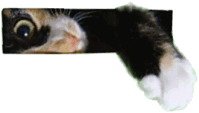Spraying
Like scratching, spraying is the most common way for a cat to mark her territory. Neutered cats spray much less often than tomcats; nevertheless if their home environment has been disturbed they may resort to spraying to reinforce their presence. Spraying may start, for example, when a new cat is introduced to the household. Other non-feline newcomers can have the same effect; a new baby for example, or even guests. Change is never welcome to a cat and she may respond by trying to mark what is familiar as hers. When a cat starts suddenly spraying even when there's been no obvious change to her domestic environment it may be that another cat has done a bit of breaking and entering. This is particularly common with cat flaps. A strange cat may use this, for instance to sneak in at night and rob the cat-food bowl. If your cat can't fight off the aggressor, it will almost certainly start spraying 'keep off: private property' scent signals over every vertical surface. Even if a cat is an outdoor cat, it is generally adviseable that she is kept indoors for the night and the catflap is closed during that time. If the cat flap becomes a big problem - for example the home is invaded while you are out at work, you may have to dispose of of the flap altogether or look for more secure alternatives - and ensure that these alternatives appear secure to the cat as well as yourself. A cat knows when it is secure behind a closed door, and is less likely to put up scent markers if she knows no-one will be coming in to read them.
A new member can make the cat less secure of her own place in the household, and she will attempt to relieve her anxiety by marking the territory as 'hers'. Here, proper introduction of the new addition is essential, so have a look at the suggestions from our article: 'Bringing a new cat home'. Spraying can also start when the cat is faced with a new environment. Even cats which have always been perfect litter tray regulars might start marking their territory if it's all new to them - it's that natural conservative streak again. With multiple cats, the easiest way to deal with that problem is to septe them into different rooms, each with their own toys and litter trays till they settle down in their new home.
Although spraying is the most common way by which a cat marks her territory, urination or even defecation may also be used for emphasis. This often happens when the cat feels threatened. In one case a single (male) human and a cat were together at home for most of the time. Then he started a new job and his girlfriend moved in. This meant that his cat was now spending a lot of time alone with his girlfriend. Every day the cat would find her human's dirty shirt or another bit of clothing and defecate on it. Human was obviously angry and distressed by this change in behaviour from his previously immaculately-behaved cat. The explanation was actually very simple. There had been two major changes in the cat's life: she was being abandoned for long periods by someone whose company she was used to, and a complete stranger had moved in. The cat was trying to make clear her closeness to the human in her life, and what better way to do this than to mix their smells? This is not an exceptional situation. Indeed people often go on holiday leaving their cat behind, and on their return discover that the cat has urinated on their clothes, beds or favourite chairs. This is insecurity and a desire for closeness - not, as many humans think, revenge for being abandoned. It's hard to do much about this apart from making sure that your laundry is not easily accessible. Give your cat as much love and attention as possible when you get back, even if your silk shirt will never be the same again. The sooner life gets back to normal, and the cat feels loved and wanted, the less need she will have to make her point in other ways.
If the problem persists you can also result to pharmacological methods. To start try using Feliway, which can be very effective at reducing spraying and inappropriate urination. If the inappropriate urination becomes a major problem your vet should be able to help. There have been many advances in behavioral pharmacology and there are number of new drugs which he may recommend. They are safe and can often help.

